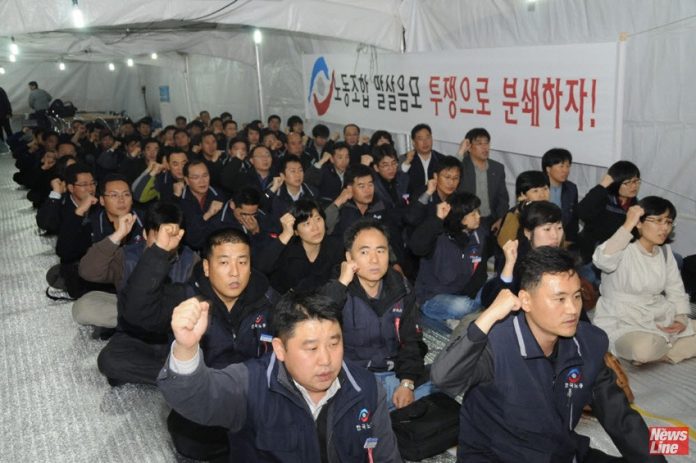A STRIKE wave is spreading across South Korea as workers in various industries fight in defence of their pay and conditions, while union membership is also rapidly increasing as a measure of the increase in class conflict.
Workers at Hanwha Total Petrochemicals Co went on a general strike on Saturday 23rd March after their wage talks with the management fell apart, with the walkout set to continue through to 7am on Thursday 28th March.
Beginning last August, Hanwha Total’s management and labour union held 11 meetings on a pay hike, but the gap was way too big.
The union asked for a 10.3 per cent increase while the management counter-offered a mere 2.3 per cent.
The union eventually cut its demand to eight per cent, but the company refused to accept it, claiming that its competitors had increased their workers’ wages on average by just two per cent last year.
According to Hanwha Total, the average annual wage of its employees was 120 million (US$105,820) last year, the highest level in Korea.
The management added that the average performance bonus paid to each employee came to 40 million won (US$35,273) as it had paid out 1,320 per cent of bonuses for three years in a row.
However, the union countered that the figures are still low in light of the company’s business performance so far.
The strike is expected to cause Hanwha Total to suffer setbacks because out of its 1,700 workers, more than 800 have now joined the trade union.
Meanwhile, unionised taxi drivers affiliated with the Korean Public Service and Transport Workers’ Union shouted slogans during a rally in front of the ruling Democratic Party’s headquarters in Seoul on Monday 25th March 25 to call on the party to pass a parliamentary bill aimed at implementing a salary system for taxi drivers.
In South Korea, drivers employed by a taxi company are expected to submit a fixed amount of income to the company on a daily basis and keep the rest, an arrangement that causes worry about unstable income if customer numbers dwindle.
And Renault Samsung Motors Corp’s union began staged strikes at designated work sites starting last Wednesday.
The union halted the assembly line for the 11am morning shifts and, due to the stoppage, the whole production line was cut off, resulting in no vehicle delivery until 3.00pm.
An assembly line at the Renault Samsung’s Busan factory also stopped for eight hours.
Under the characteristics of the automobile production line, if one process stops, the remaining processes cannot be completed properly, and an overall production disruption is inevitable.
The union says that the reason it has launched a designated strike is because it can reduce wage losses by minimising the number of union members participating in the strike, while maintaining the effect of a complete work stoppage.
Renault Samsung’s management and labour union have not set a deadline for future negotiations since intensive negotiations broke down on 8th March.
In the process, the union announced a three-day partial strike in all departments on 11th March, followed by a partial walkout from that day to last Friday.
The Korean Automobile and Transport Workers’ Federation has also announced it is to hold a nationwide bus drivers strike in May, if the government does not compensate its members for lost income resulting from implementation of the 52-hour work week system which is set to start in July.
Bus drivers claim that the 52-hour work week will drastically reduce their monthly paycheque.
The federation plans to release their strike settlement conditions on 29th April and if the conditions are not met, bus drivers plan to hold a nationwide strike in mid-May.
The federation is by far the largest bus driver union in the country with over 83,000 members.
‘There have been bus strikes in parts of the country before, but it is unprecedented to have a whole federation conducting a nationwide strike,’ an official from the Ministry of Employment and Labour said.
The federation warns that the government’s 52-hour work week restriction will drastically reduce their pay.
The restriction is scheduled to be enforced on 1st July, and will apply to bus companies that have more than 300 employees.
Initially, the restriction did not apply to bus companies, however, last year a revision was made to the labour law to include them.
According to the Korea Research Institute of Transportation Industries, an average monthly paycheque for a bus driver is 3.54 million won ($3,130), however, the base pay is only 49 per cent of the total and the rest consists of overtime pay.
‘Once the 52-hour work week is enforced, bus drivers’ monthly pay will decrease 10 to 20 per cent,’ an official from the federation said.
‘At the minimum, the company needs to preserve our pay.’
Bus companies say they can’t afford to preserve drivers’ wages and at the same time hire more employees to fill the workforce.
‘Most of the bus companies are getting assistance from local government already. In addition, we need to deal with the recent minimum wage hike and have to employ more workers due to the 52-hour work restriction, we will not be able to cover the costs,’ a senior executive at a Gyeonggi Province bus company claimed.
Both unions and management are calling for assistance from the government for budget support.
‘To normalise operation at bus companies the government needs to compensate for the losses from the 52-hour work week, elderly and bus transfer discounts,’ the federation said.
Many experts predict there will be traffic chaos when the nationwide bus strike begins, which will become a hefty burden on students and low-income families.
They say deploying government charter buses and extension of subway operations will be hardly enough to cover for the strike.
